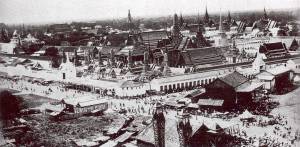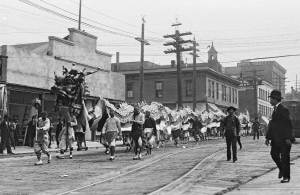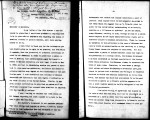In 1898, shortly after US naval forces had captured Manila, a man of Chinese ethnicity arrived at the port in Bangkok on a boat from Manila and claimed to be an American citizen.
Chin Kim Tian Seng was this man’s name, and his claim led to a joint inquiry by representatives from the Siamese and US governments, and to the exchange of numerous letters.
Today I came across a couple of letters pertaining to this case, however there must have been many more, and it is therefore difficult to get a clear sense of what exactly transpired. Nonetheless, from the bit that can be seen in these documents, it is obvious that determining nationality was not an easy matter.
Siamese Minister for Foreign Affairs, Prince Devawongse, described the situation well when he made the following comments:
“As you are aware, every Chinaman, residing in Siam, belongs by race to a nation whose subjects do not enjoy extra-territorial rights and is therefore subject to Siamese jurisdiction.”
“There is, however, an exception to this principle in the case of Chinamen who have by birth or naturalization on the territory of a foreign Treaty Power become the subjects of such Power.”
“For this reason when a person of Chinese descent claims the right to the protection of a foreign nation, the Siamese Government is as much interested as the Representative of the Foreign Power whose protection the Chinaman claims, to ascertain the truth of such claim.”
American Consul in Bangkok Hamilton King, meanwhile, apparently believed that there was a clear technique for ascertaining the truth of such a claim, as the one that Chin Kim Tian Seng was making. The consul stated the following:
“According to American Law every person born in the United States is an American citizen and no difference is made in the case of Chinamen or persons of whatever race or origin. The Consul has the right to register all such persons on the proof of their birth in America.”
All of this sounds reasonable. The following comment, however, is one that I had never heard of before:
“This proof [of birth in the US] need not, as in other countries, be accompanied by any documents such as certificate of birth etc., verbal evidence or even the mere statement of the interested party is sufficient if the Consul be satisfied with it.”
So from Consul King’s perspective, all Chin Kim Tian Seng needed to do was to say that “I was born in America.” I’m sure that Prince Devawongse must not have agreed with that position.
In the end, I wonder what was going on here? Why did Chin Kim Tian Seng claim to be an American? And why did the US Consul apparently wish to support this claim?
Was this just part of the colonial/imperial game at the time? And by that I mean were the Americans simply trying to “keep the Siamese in their place” by seeking to limit their legal authority?
I wish I knew more about this. In any case, the story eventually made it back to the US, and was reported in a newspaper in Tacoma, Washington under the headline, “A CITIZEN BY CONQUEST, A Chinaman from Manila Becomes a Naturalized American in Siam at the Hands of our Minister There.”
The article then went as follows:
“A Chinaman claiming to have come from Manila, applied to the American Minister at Bangkok for passports to travel, in Siam. After the glorious exploit of Admiral Dewey [the American admiral who directed the capture of Manila], he explained, he had no alternative but to become an American citizen.”
“Mr. Hamilton King performed a naturalization ceremony on the spot and applied for passports in due form, but Prince Devawongse objected to the celestial’s standing.”
“The United States Minister rejoined that American protection was claimed for him ‘by right of conquest.’ There the matter stands for the present.”









This Post Has One Comment
Most Chinese migrants to the Americas during this era came from Sam Yup and Sze Yup regions of Guangdong. SEA had most their Chinese migrants from Fujian (Minnan) and Chaozhou regions with the exception of Vietnam (mainly Cantonese). My maternal great grandfather used papers to get into the US because of the fire during SF 1906 earthquake, but my own grandfather was born and raised in the Mainland (China). My own family are deeply intertwined with the past history and events of both the Americas and Asia. My own parents are immigrants, but their own family pasts tell me much more. SEA’s relationship with China is especially complex because they are one the most numerous minority in the region, and many of politicians in these region may even have Chinese ancestors, ex. the Aquino-Cojuangco family of the Philippines. Sometimes SEA may view China as friend and sometimes not so much.